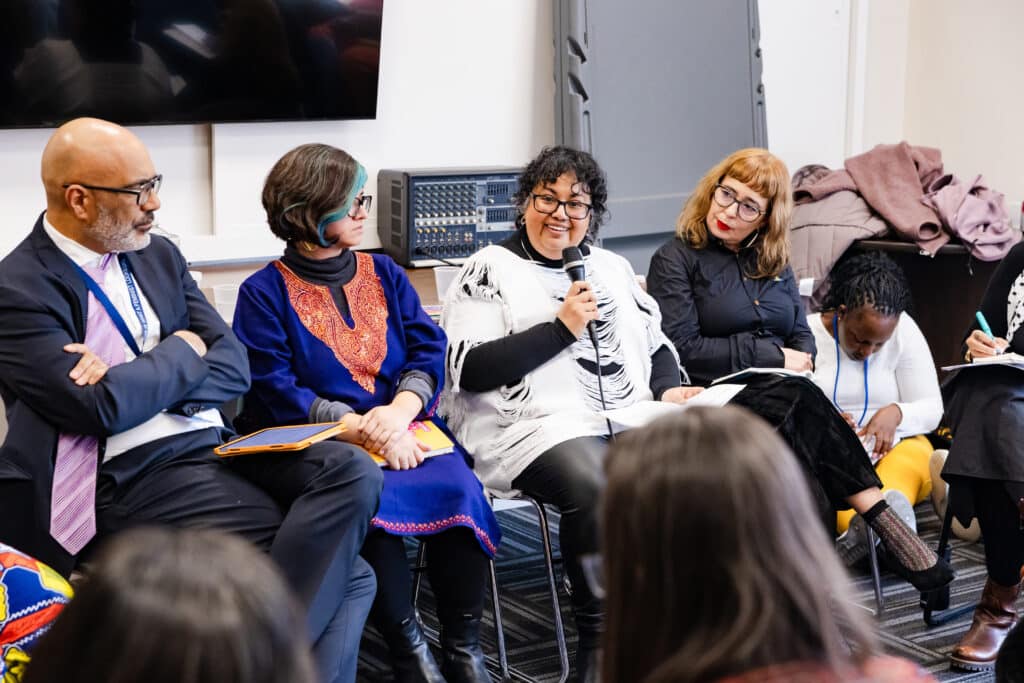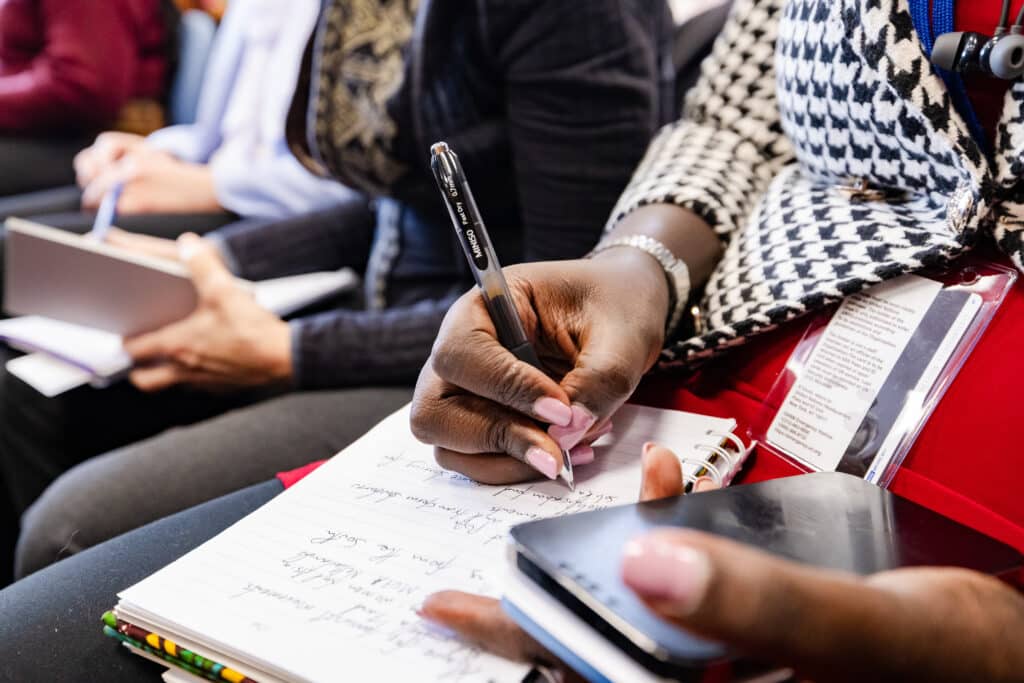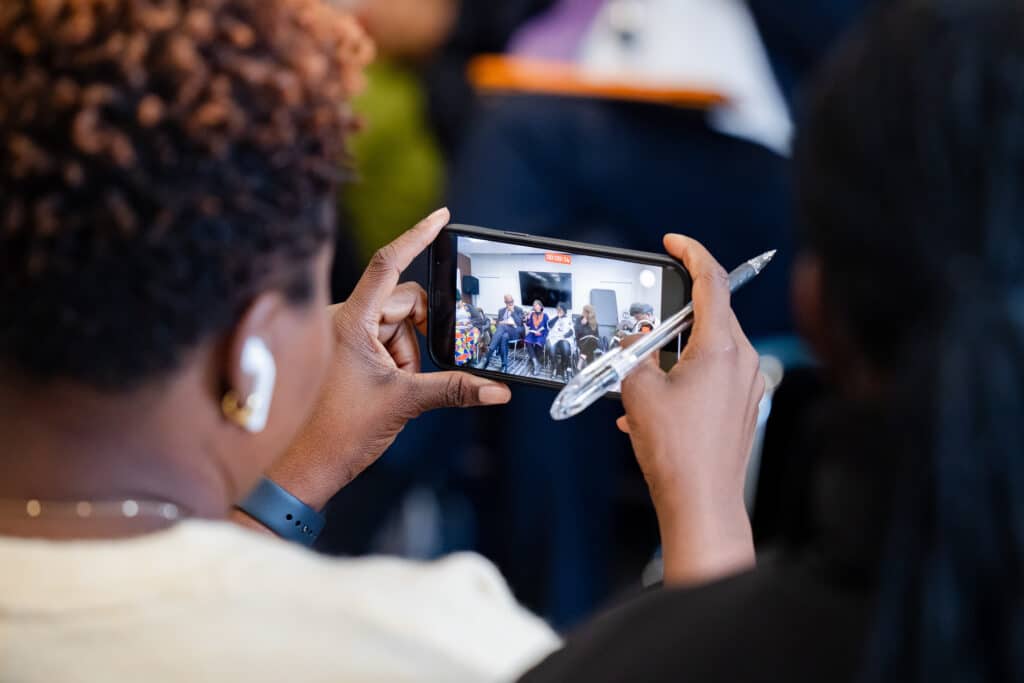Feminist movements advance gender equality and human rights by influencing policies, strengthening institutions, and changing social norms. They operate under precarious conditions in the face of rising authoritarianism, anti-gender movements* and polycrises**. And yet, donors collectively under-resource feminist movements. The Alliance for Feminist Movements, Count Me In!, and Leading from the South organised a CSW68 parallel event highlighting the urgency for donors to fund, trust, and operate in solidarity with feminist movements.
“The question is if we don’t invest in feminist movements, what are we risking? – Anisha Chugh, Women’s Fund Asia
On March 13th, at the UN Church Centre, in a room full of funders and feminist activists, a discussion unfolded on how to resource feminist movements effectively. The consensus in the room was that feminist activism works. It has made significant social changes in the last decades to claim rights, equality, and justice for structurally excluded groups. Yet, less than 1% of all government Official Development Assistance (ODA) goes to feminist funding while governments publicly commit to work towards equality and justice. In the background, the forces pushing the anti-gender agenda are getting stronger, bigger, and more organised every single day. They have no shortage of resources and support. So, the predominant question echoed through the conversation: What are we risking if we do not support feminist movements effectively?
“Meet movements where they are. If you can’t fund more, fund core.” – Immaculate Mugo, Urgent Action Fund – Africa


While unpacking how to better fund feminist movements, the speakers pointed out some key challenges. Governments often face resistance when convincing parliament and the general public about the importance of funding feminist movements in the Global South, while feminist organisations and movements are hamstrung at multiple levels.
Firstly, funders don’t fund in ways that recognise that change is a long-term process. Short-term funding and constantly changing focus cannot strengthen social movements and yield meaningful results. Secondly, there is a lack of trust in South-based movements. Most funders still fund through North-based organisations, whereas it is the South-based organisations and movements that are the experts in bringing about change in their contexts. The lack of trust also results in restrictive requirements and heavy reporting procedures that require too much of the precious time and energy that could better be spent on the actual work that needs to be done. This also makes it impossible for many movements and organisations to apply for funding, let alone access it.
“There has been a lot of unmet Official Development Assistance over decades, which is trillions of dollars owed to developing countries.” – Sachini Perera, RESURJ


There are, however, some examples of change in the right direction. To better support South-based movements, the Dutch government, for example, focuses on achieving greater localisation and operationalising Feminist Foreign Policy. A great example of the Dutch government’s localisation efforts is the growth of the Leading from the South program, in which funds are given to South-based feminist funds, which then provide resources to several South-based feminist organisations working towards realising the human rights of structurally excluded communities.
Speakers shared more examples of practices that are changing the feminist funding landscape. Participatory grantmaking practised by the Red Umbrella Fund involves representatives and activists from local organisations in the selection process. Just Associates makes small amounts of money available within 48 hours upon request, for the movements, community-based activists, registered and unregistered organisations they accompany as part of urgent support that can strengthen organising and movement building.
“Sex worker rights need feminism, and feminism needs sex worker rights… it’s the power of alliance that I am invited here where people like us are often not invited.” – Vera Rodriguez, Red Umbrella Fund
“The mobilisation fund is rooted in resource sharing as an expression of a movement practice historically – solidarity. Underlying it is a rationale that says, how can we use our positioning to leverage resources, including money, for movements in struggle.” – Shereen Essof, JASS
Feminist movements are increasingly under attack, and there is very little money to support them in a context where anti-gender forces are getting stronger and stronger. To combat this:
- Funders must prioritise multi-year, flexible core funding and
- Feminist organisations and movements should tap more into the power of alliance – highlighting the intersectionality of urgent issues like human rights, environmental and racial justice, and gender equality while accessing funds beyond the pittance reserved for gender equality; and bridging the gaps of small disagreements and building massive movements to push forward for justice and rights for all.
“We need your help sharing your stories, experiences, and good practices. Storytelling is still very much undervalued. And we need stories to understand, and also to explain to our own audiences what you are doing.” – Peter Derrek Hof, Dutch Ministry of Foreign Affairs
Funders need to listen more to feminist activists and organisations and trust them. Trust needs to be reflected in the application, selection and reporting processes. The Dutch government adopted a Feminist Foreign Policy (FFP) to integrate more trust and understanding in the funding process. Feminist movements need to emphasise telling the stories of their struggles and successes to win more hearts and minds. Funders must strive to be more inclusive of voices from the margins, groups that do not speak the colonial languages, are unregistered, or simply do not have the time or resources to apply for funding.
On the 13th of March, the CSW parallel event, “Feminist Financing Practices: Funding Movements to Make Change” was organised by Alliance for Feminist Movements, Count Me In!, and Leading from the South and co-sponsored by the Dutch Ministry of Foreign Affairs. Speakers were: Anisha Chugh, Executive Director at Women’s Fund Asia; Peter Derrek Hof, Director of Social Development and Ambassador for Women’s Rights and Gender Equality at the Ministry of Foreign Affairs of the Netherlands; Shereen Essof, Executive Director at Just Associates; Vera Rodriguez, Programme Associate at Red Umbrella Fund. Sachini Perera from RESURJ and Immaculate Mugo from Urgent Action Fund – Africa co-moderated the discussion.
*Anti-gender or anti-rights movements is an umbrella term for social movements that seek to uphold so-called ‘traditional’ gender roles and identities, and oppose feminist values and the basic human rights of LGBTQIA+ people. These movements are often associated with racism, sexism and other forms of hate, as well as climate change denial.
**Polycrisis is a time of great disagreement, confusion, or suffering caused by many different problems happening simultaneously and having a very big effect together.

